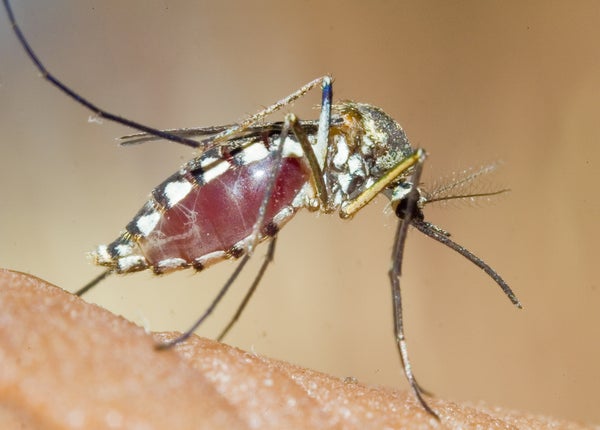When it comes to attraction, the allure can begin even before she sets eyes on you. There seems to be something about the way you—her dinner—smells from afar that makes you a desired target. While you are chatting with friends or overseeing the barbecue, that mosquito will go on the hunt and make you her next blood meal. But what makes you so attractive to tiny ankle biters?
This month a group of British researchers is launching a new investigation into the role of human genetics in this process. They are planning to collect smelly socks from 200 sets of identical and nonidentical twins, place the footwear in a wind tunnel with the bugs and see what happens next. The owners of the socks, the scientists hope, may naturally produce attractive or repellant chemicals that could become the basis for future mosquito control efforts. The researchers expect that studying the popularity of the garments the skeeters hone in on—and analyzing both the odor compounds in them and the genetics of their owners—could help. The study, which will include 100 twins each from the U.K. and from the Gambia, will start recruiting volunteers in the coming weeks.
“We know very little about the genetics of what makes us attractive to mosquitoes,” says James Logan, a medical entomologist at the London School of Hygiene and Tropical Medicine who is leading the work. Earlier studies suggest visual, olfactory and thermal (body heat) cues all help drive mosquito attraction. “We hope this study will give us more insights into the mechanisms that help change our body odors to make us more or less attractive to mosquitos,” he says. “If we can identify important genes, perhaps we could develop a pill or medication that would allow the body to produce natural repellents to keep mosquitoes away.” The findings, he adds, could also help epidemiologists improve their models for how vulnerable certain populations may be to disease-carrying mosquitoes.
On supporting science journalism
If you're enjoying this article, consider supporting our award-winning journalism by subscribing. By purchasing a subscription you are helping to ensure the future of impactful stories about the discoveries and ideas shaping our world today.
Already scientists know there are differences among us that contribute to why some of us get bitten more. Those of us who exhale more carbon dioxide seem to be a natural beacon for mosquitoes, in particular. Researchers have also found a correlation with body size, with taller or larger people tending to attract more bites—perhaps because of their carbon dioxide output or body surface area. There is also some evidence women who are pregnant or at certain phases of the menstrual cycle are more attractive to mosquitoes. Other work has found that people infected with malaria are more attractive to malaria-carrying mosquitoes during their transmissible stage of infection.
But what of our individual genetics? Two years ago Logan’s team published a small study looking at 18 sets of identical twins and 19 sets of nonidentical twins and their attractiveness to mosquitoes. They found that identical twins were more similar in their desirability to the blood-sucking insects than the nonidentical twins. Because earlier work had found that identical twins smell more alike than nonidentical twins, the British researchers surmised genes may play a role in this mosquito attractiveness.
This new study aims to nail down some more concrete conclusions with its larger sample size and add another population into the mix. (Most research in this area has focused on European Caucasians whereas this study will also include twins from the Gambia). There are other differences that set this apart from their earlier work, too: The 2015 study had tested attractiveness among Aedes mosquitoes—those that carry dengue and Zika—whereas this study will test attractiveness among Anopheles mosquitoes, a species that can transmit malaria. The team suspects the different species will be attracted to the same volatile compounds in human odor but wants to explore this further.
“This is novel work and it’s a good step. It will tell us if there are genetic differences or not but it won’t be a complete answer about mosquito attraction because other factors like diet, wind, time of day and mosquito species can all influence that,” says Zainulabeuddin Syed, a professor of biological sciences at the University of Notre Dame who studies the smell-influenced behavior and movement of insects and is not involved in the Logan project. Syed’s work has found that people of various ethnic groups all seem to produce four major volatile compounds (although at varying levels) and there are some early hints that one compound in particular, called nonanal, may be particularly attractive, at least among certain species of mosquitoes.
Exactly what genes contribute to producing compounds that could possibly interest mosquitoes remains a vast unknown. Scientists that study human odors and genetics have previously suggested scent cues associated with genetics are likely controlled via the major histocompatibility complex (MHC) genes. Those genes appear to play a role in odor production and also in mammals’ mating choices—because humans and mice alike appear to prefer mates that smell less similar to themselves, which scientists have theorized may be a natural control against inbreeding. As a result, Logan’s team may target those odor-linked genes, but he says they are looking at all the options. In the next couple of years, he says, they hope to have some early answers. For now, and likely for many years to come, we can only slather on some bug repellant and hope for the best.
